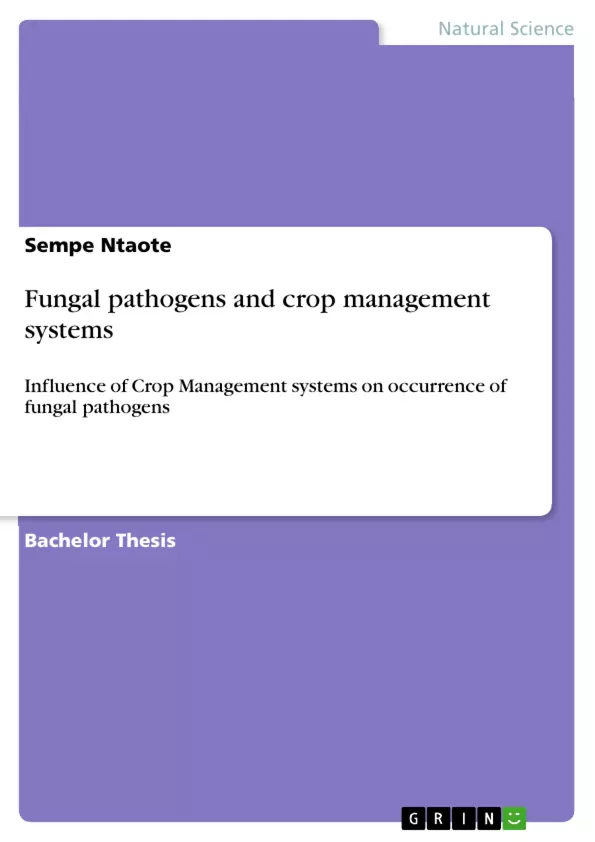
Fungal pathogens and crop management systems
Bachelorarbeit, 2025
33 Seiten, Note: Distinction
Pathogenic fungi in tomato plants (Solanum lycopersicum) pose a significant threat to agricultural productivity and food safety. This study aimed to isolate and identify pathogenic fungi from tomatoes grown under different crop management systems, and to compare their occurrence across these systems. Ninety-six tomato samples were collected from each of the four plots depicting different management regimes in Mohales-Hoek, Lesotho. Plots were dedicated to a specific management system comprising a natural system (control), conventional system, integrated system and inter-cropping. The samples were transported to the microbiology laboratory at the National University of Lesotho. Pathogenic fungi were isolated using potato dextrose agar (PDA) and identified through macroscopic and microscopic observations. Four pathogenic fungal genera of Alternaria, Penicillium, Botrytis, and Fusarium, were identified and the percentage incidence of fungi genera was calculated. The study revealed variations in the incidences of these fungi across different crop management systems. The highest occurrence was found in Alternaria, which ranged from 22.29% in integrated systems to 48.96% in the natural system. Fusarium occurrence varied from 11.46% (integrated) to 18.75% (natural and intercropping). In the natural system, Penicillium was the most common (19.79%), whereas Botrytis was the least common in intercropping (2.13%).
Comparing integrated and intercropping systems with conventional and natural approaches, revealed considerable decreases in fungal contamination. In conclusion, the present study hypothesises that effective and sustainable crop management is capable of lowering post-harvest losses and fungal diseases. The study further suggests instituting integrated management systems may improve tomato output and reduce spoilage risks.
Details
- Titel
- Fungal pathogens and crop management systems
- Untertitel
- Influence of Crop Management systems on occurrence of fungal pathogens
- Veranstaltung
- BSc Biotechnology
- Note
- Distinction
- Autor
- Sempe Ntaote (Autor:in)
- Erscheinungsjahr
- 2025
- Seiten
- 33
- Katalognummer
- V1552420
- ISBN (Buch)
- 9783389137550
- Sprache
- Englisch
- Schlagworte
- Fungal pathogens, crop management systems
- Produktsicherheit
- GRIN Publishing GmbH
- Preis (Ebook)
- US$ 18,99
- Preis (Book)
- US$ 22,99
- Arbeit zitieren
- Sempe Ntaote (Autor:in), 2025, Fungal pathogens and crop management systems, München, Page::Imprint:: GRINVerlagOHG, https://www.diplomarbeiten24.de/document/1552420
- Autor werden
- Ihre Optionen
- Vertriebskanäle
- Premium Services
- Autorenprofil
- Textarten und Formate
- Services für Verlage, Hochschulen, Unternehmen

- © GRIN Publishing GmbH.
- Alle Inhalte urheberrechtlich geschützt. Kopieren und verbreiten untersagt.
- info@grin.com
- AGB
- Open Publishing
Der GRIN Verlag hat sich seit 1998 auf die Veröffentlichung akademischer eBooks und Bücher spezialisiert. Der GRIN Verlag steht damit als erstes Unternehmen für User Generated Quality Content. Die Verlagsseiten GRIN.com, Hausarbeiten.de und Diplomarbeiten24 bieten für Hochschullehrer, Absolventen und Studenten die ideale Plattform, wissenschaftliche Texte wie Hausarbeiten, Referate, Bachelorarbeiten, Masterarbeiten, Diplomarbeiten, Dissertationen und wissenschaftliche Aufsätze einem breiten Publikum zu präsentieren.
Kostenfreie Veröffentlichung: Hausarbeit, Bachelorarbeit, Diplomarbeit, Dissertation, Masterarbeit, Interpretation oder Referat jetzt veröffentlichen!
- GRIN Verlag GmbH
-
- Nymphenburger Str. 86
- 80636
- Munich, Deutschland
- +49 89-550559-0
- +49 89-550559-10
- info@grin.com
-









